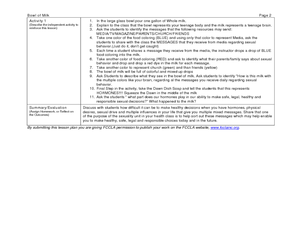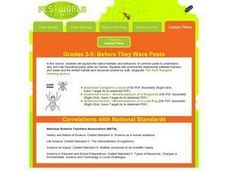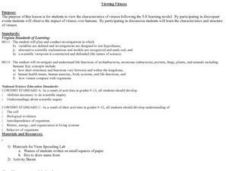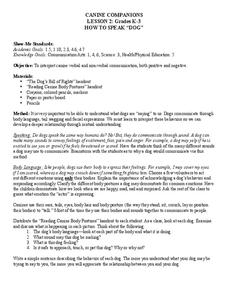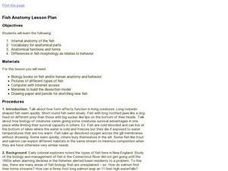Curated OER
Bowl of Milk
Students analyze mixed messages about sexual behavior. In this sex education lesson, students use a milk bowl and food coloring to identify the mixed messages about sexual behavior. Students discuss the mixed messages for the topic and...
Curated OER
An Introduction to the Ocean World
Students comprehend how the organisms that exist within the ocean biome, and categorizing each into producer, consumer, or decomposer. They place various human actions under the headings of "hazard" or "help," illustrating how humans can...
Curated OER
The Rain Forest
Students acquire knowledge about the basics of the tropical rain forest ecosystem. They analyze the cause/effect relationship between humans attitudes and behavior and the evnvironment. Students list the four general layers of vegetation...
Curated OER
Getting to Know Yourself: Developing and Accessing Intrapersonal Intelligence Among Early Adolescents
Students improve understanding of the concept of self-awareness by differentiating the internal from the external world. They develop a vocabulary to describe feelings and to understand the uniqueness and variations of people's inner...
Curated OER
Lighting Our Way
Students read a variety of web-based articles to explore the history of human understanding of light. They investigate light waves and read about the work of Albert Einstein.
Curated OER
Sexual Selection in the Animal Kingdom
Students research how sexual selection plays a role in driving evolution. They experiment how variation exists within not just obvious physical traits, but metabolically and behaviorally. They write a letter describing a problem, and a...
Curated OER
Before They Were Pests
Students explore the native habitats and behaviors of common pests to explain why and how household pests enter our homes. Theyexamine the relationship between humans and pests and the limited habitat and resources shared by both.
Curated OER
Hypothermia on the High Seas
Students identify and present the effects on humans when the body temperature falls, demonstrate and explain how the body loses heat, and understand hypothermia and cold water survival techniques.
Curated OER
Viewing Viruses
Students view the characteristics of viruses following the 5-E learning model. By participating in discrepant events Students observe the impact of viruses over humans. By participating in discussion students examine the characteristics...
Curated OER
Archeological Finds
Students explore archeology and it contributions to human history. They write a magazine article describing the discovery of a dig.
Curated OER
Genetics, Birth Disorders, and Pregnancy
Students in an alternative school setting for pregnant teens examine various facets of pregnancy including prenatal and postpartum testing, genetic influences, and additional risk factors. Through videos, hands-on activities, and small...
Curated OER
Fabulous Felines
Students learn how cats communicate with humans. In this non verbal communication lesson, students learn how cats communicate with humans. Students discuss how they communicate their thoughts and feelings and the differences between...
Curated OER
Canine Companions
Students interpret canine verbal and non-verbal communication. In this dog communication instructional activity, students discuss dog communication through bark and body language. Students study the 'reading canine body postures'...
Curated OER
Invertebrate Research Project
Students keep a scientific research notebook on an invertebrate detailing its behavior and responses.
Curated OER
Anne Frank: Rescuers
Young scholars discuss heroic behavior of individuals from the Holocaust. They examine early civilizations and their contributions to the foundations of human culture. They
recognize that heroic behavior (just like discrimination) is...
Curated OER
Seabird Survival Adaptation Card Game
Students study seabirds and how they have adapted to their environments. In this activity based instructional activity students will play a card game that will allow them to have a better understanding of seabirds and their adaptations.
Curated OER
Fables Unit Lesson Plan
Students study fables in a broad context. In this literary lesson on fables, students define terms unique to them. Students use a variety of technological resources to gather and classify information into three categories. Students also...
Curated OER
Predator-Prey Relationships
Students understand ecological systems. They provide experiences to assist citizens to increase their sensitivity and stewardship for the environment.
Curated OER
Brief Encounters (Looking at Ourselves and Others)
Students participate in a simulation in which they examine how different cultures interact with one another. In groups, they follow the behaviors for their specific group while a group of observers records their interactions. To end the...
Curated OER
Fish Anatomy
Young scholars identify and interpret the internal anatomy of the fish. They also identify and define vocabulary for anatomical parts and anatomical functions and forms. Finally, students identify and interpret the differences in fish...
Curated OER
Learning to Communicate with Dogs: The Importance of Training
Students learn the importance of communication especially when it comes to animals. Students are shown video clips of a dog displaying unwanted behavior. Students participate in a class brainstorm where they list ideas of how people...
Curated OER
Everything You Know Is Wrong 1: Us and Them
Students explore rational, irrational, analytical and non-analytical methods of reasoning. They participate in numerous exercises and hands-on activities to understand assumptions and how most people think. Students establish the...
Curated OER
Discussion of Adaptation
Students discuss ways in which dinosaurs adapted to their environments. They apply the same logic to an analysis of human habitat, survival needs, and survival need fulfillment to explain how people have adapted to their environment.
Curated OER
What Is Culture
Fourth graders investigate the concept of culture. They look into the influences that shape culture and how it effects people and regional areas. Students answer the question of why it is important to study culture to have a better...


